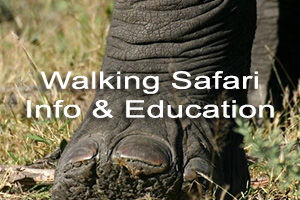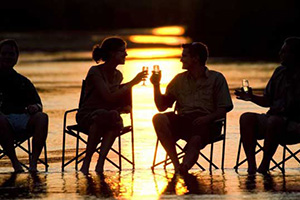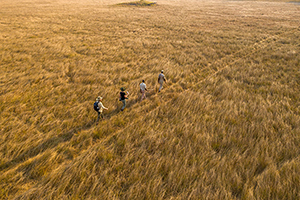Walking Safari Info & Education
What to Expect & What You Need to Know
A walking safari provides an opportunity to observe and experience the intricacies of the bush, nature and wildlife at close quarters. The joy of exploration and discovery on foot awakens the senses as you touch, feel, smell and hear the sounds of the bush. As the secrets of the wilderness and the many facets of the bush unfold one soon develops a greater understanding and appreciation for the many small often overlooked creatures and the role, trees, plants, insects and birds play in the life cycles of nature.
I believe walking safaris comprise four different types or styles so it’s important to try and establish what your expectations are when you say you want to walk. I will point out the different options below and explain which you think would be the most suitable for you.
Nature walk - is usually a short guided walk that focuses on the environment around camp. Relaxed, interactive and fun its ideal for kids or those who want to stretch their legs and at the same time learn about the world of plants and insects that are so often overlooked when out on a vehicle.
Bush walk - offered as an inclusive camp activity a bush walk usually takes place early in the morning when it’s cool and spoor from the night before is still fresh. Group size is usually a maximum of 6 guests and duration may be between 2 and 4 hours but usually around 3 hours with a break for tea/coffee. Emphasis is on the experience not the distance covered which is usually no more than 5 miles and the pace is usually that of the slowest participant. Although the terrain can be rough, guides follow well-worn game trails which makes for relatively easy walking.
Walking safari - is more hard core as the focus is on exploring the bush on foot rather than by vehicle. In Zambia a handful of authentic walking camps are situated in areas with no road or a very limited road network so the only activity is walking. A typical walking safari day starts early as this is when the wildlife is usually most active and the temperature cool and pleasant. A mid-morning tea/coffee break provides an opportunity to ask questions and discuss the morning’s action. A leisurely brunch/lunch is served back in camp and is followed by a siesta before heading out on a short late afternoon walk. The day ends with sundowners back in camp around a glowing fire followed by dinner served under the stars. The hallmark of a great walking safari is authenticity, a phenomenal guide, a comfortable bed and tasty food!
Multi-day walking safari - offers an authentic, very real wilderness adventure where guests walk between camps and nights are spent sleeping out in a fly camp or under the stars. All luggage and supplies are transported by porters. Walking through pristine bush far off the beaten track in big game country is a unique and an unforgettable experience that for many is humbling and for some literally life changing - in a positive way!.
Not to be forgotten is a San Bushman Walk - offered by the Botswana Kalahari camps. Led by a San Bushman guide or tracker or even a small group of family members this educational walk usually takes place in the vicinity of camp. It provides a fascinating insight into the nomadic lifestyle of one of Africa’s oldest cultures which is fast vanishing. Glimpse into the astonishing wisdom of the San as you learn about their survival skills, how they used to hunt, gather food, store water, use plants for medicinal purposes and make fire.
Prime Walking Destinations - Mana Pools National Park in Zimbabwe is on the Zambezi reiver, South and North Luangwa National Parks in Zambia and the Okavango Delta in Botswana boast all the ingredients associated with an exceptional walking safari - remoteness, pristine wilderness, spectacular scenery and big game!
Need to Know
Age limits - if a family is travelling always establish what the minimum age limit is for walking as it varies from camp to camp and destination to destination - it could be 10, 12 or 16 years.
Rifle - in Botswana there are camps that offer walking where the guide doesn’t carry a rifle. If this is the case we must advise you at the time of booking. Please ask us!
Safety - first aid kits are carried and contact with camp may be by mobile phone or in remote areas by short wave radio. Senior staff members are qualified first aiders.
Insurance -This is highly important for our guests to take out travel insurance, for unforeseeable circumstances and situations beyond our control.
Dietary requests - walking takes place in remote areas hence the importance of advising any dietary requests well in advance of travel.
Botswana
National Parks - although walking is not permitted in National Parks there are a couple of exceptions namely Tau Pan, Nxai Pan and Kalahari Plains where San Bushman walks take place in the vicinity of camp. Kalahari Plains has recently been given the go ahead to offer seasonal guided nature walks subject to availability of a walking guide.
Walking guides - not all camps have fully licensed and accredited weapon handling walking guides hence walking is guide dependant. Should walking be a priority for guests we need to advise the camp at the time of booking so they can make sure a walking guide is available.
Walking without a rifle - there are camps that offer walking where the guide doesn’t carry a rifle. There are a couple of reasons for this
(1) walking takes place on islands or on open flood plains where there is good visibility and few predators, this is especially true of camps situated in the permanent delta.
(2) Guides at camps like Delta Camp, Oddballs, Oddballs Enclave and Nxamaseri Island Lodge belong to the Bayei tribe, also known as River Bushmen. Having grown up in the area their knowledge of the waterways, islands, floodplains and game, which is largely aquatic, is second to none.
(3) There are mixed views on walking with a rifle, even in areas with predators. There are those who believe having the security of a rifle encourages or emboldens guides to push the envelope a little too far. Experienced guides that are very familiar with their area are happy to walk without rifles as they allow the animals to move as they please and take their lead from the animal’s behaviour.
Bush walk
In Botswana most of the camps situated in areas of permanent or semi-permanent water include a morning bush walk (walking guide dependant) in their inclusive activity offering. A full day walking safari is not a standard activity which means a private guide and vehicle must be booked at additional cost.
Multi-day walking safari
Although a number of camps and lodges offer walking as an activity there are only a handful that offer off the beaten track multi-day walking safaris. The safaris mentioned below may be subject to water levels and may not be available in green season.
Ker & Downey’s Footsteps Across the Delta - the emphasis is on exploring the diverse and beautiful Okavango Delta, as the first African explorers did, either on foot or by mokoro
David Foot Walking Safaris - offers a 3 night set departure walking safari. Longer safaris of up to 7 nights are available on request and include overnights at two different mobile camps
Delta Camp Chief’s Island Walking Trail - minimum 4 nights walking and mokoro trail with the first and last nights spent at Delta Camp
-
Walk Mashatu - explore the spectacular landscape of Mashatu on a 2-3 night walking safari with Stuart Quinn, an extremely experienced and highly qualified walking guide
Zimbabwe
Walking guides - guides in Zimbabwe are amongst the best of the best. With safety being paramount walking safaris can only be conducted by a Pro Guide who has a full gun licence and is experienced in all the disciplines of walking in the wild. To become a Pro Guide in Zimbabwe is a great achievement as the training is rigorous and requires at least five years bush walking experience.
Walking with a rifle - in Zimbabwe it’s mandatory for guides to carry a rifle when leading walks.
Bush walks - all camps in safari areas offer bush walks in the company of top notch guides. There are however a handful of small privately owned camps that warrant special mention as their guides, most of whom are owners, are outstanding. Please note these are not luxury camps as the emphasis is on experience rather than décor! These are:-
Vundu Camp, Mana Pools National Park
Camp Mana - Mana Pools National Park
Goliath Camp - Mana Pools National Park
Musango Safari Camp - Lake Kariba
Rhino Safari Camp - Lake Kariba
Camp Hwange - Hwange National Park
Multi-day walking safaris
All these safaris provide a unique opportunity to experience the unexpected as there are few things as exhilarating as tracking wildlife on foot!
Chitake Mobile Camp, Mana Pools - offers one of the most intense and intimate wildlife experiences that will appeal to those who like their wildlife wild!
-
Ivory Trail Adventure - provides the truly adventurous traveller with the opportunity to explore the rugged and beautiful landscapes of Gonarezhou National Park.
-
Chilo Gorge Tented Camp - a small wilderness bush camp overlooking the Runde River in Gonarezhou National Park. Walking in Gonarezhou is not for the faint hearted as there is a large elephant population.
-
Hwange Bush Camp - offers a rustic fly camping experience in the remote northern region of Hwange National Park. Explore woodlands, rock outcrops, natural springs and seasonal river beds and expect up-close-and-personal encounters with a variety of wildlife species.
A private walking safaris with Julian Brookstein or James Varden who guide in Hwange, Gonarezhou, Mana Pools and Matopos.
-
The Turaco Trail, Eastern Highlands - is Zimbabwe’s most beautiful and challenging hiking trail. Covering the area between Mutarazi Falls National Park through to the Pungwe Gorge hikers will journey through a vast mountain wilderness of wild rivers and waterfalls, forests, montane grasslands, valleys, gorges and mountain peaks.
Zambia
Zambia and more specifically South Luangwa National Park is often referred to as home or birthplace of the walking safari and is considered to offer some of the finest walking areas and safaris on the African continent. Pioneered by Norman Carr, the doyen of Zambian conservation, walking safaris have been a cornerstone of Zambia’s safari industry since the early 60’s.
In the early days safaris in Zambia centred on walking, the camps were extremely basic as they were essentially reed huts furnished with a stretcher bed, open air bucket shower and long drop loo. Set up in June, which was the beginning of the walking season, they were dismantled and packed away at the end of October before the onset of the rains. Over the years so much has changed and Zambia can now hold its head up high as there are plenty of wonderful, small, intimate bush camps that ooze charm and character.
It goes without saying all the bush camps in South Luangwa offer walking as an activity however there are still some traditional walking camps that embody the authentic charm of old Africa. Offering different degrees of comfort ones that spring to mind are Kuyenda Bushcamp, Mwamba, Island Bush Camp, Nkonzi Bush Camp, Nsefu, Time + Tide Luwi, Time + Tide Nsolo. Dedicated walking camp are Mapazi Camp, Chikolo Tree Camp, Crocodile River Camp.
Walking guides - walks are led by a ZAWA scout from the Department of National Park and Wildlife who carries a rifle and walks in front of the camp guide who is unarmed so he can focus on his clients.
Walking season -varies depending on the camp but is usually between mid-May and mid-October. Camps open after the rains and close before the onset of the rains.
Minimum age - 13 years as per ZAWA regulations but is ultimately at the discretion of the walking guide or camp manager.
Walking between camps
It’s possible to walk between the following camps. Should you wish to do so please advise us at the time of booking so we can request this.
Bushcamp Company: Chindeni to Bilmungwe 3.5hrs, Bilimungwe to Kapamba 3hrs, Kapamba to Zungulila 2.5hrs
Time + Tide: Mchenja to Nsolo 4hrs, Mchenja to Kakuli 3hrs, Kakuli to Nsolo 4.5hrs, Nsolo to Luwi 3.5hrs
Kafunta Safaris: Island Bush Camp and Three Rivers Camp: 10km which takes the best part of a morning as it includes two river crossings
Multi-day walking safaris
The following suggested camp combos will allow guests to focus on walking but at the same time experience different habitats, terrain and scenery.
Tafika Camp, Chikoko Trails Camps (Chikoko Tree Camp and Crocodile River Camp )in South Luangwa and Mwaleshi Camp or Takwela Camp in North Luangwa
Kafunta River Lodge, Island Bush Camp and Three Rivers Camp all in South Luangwa
Robin Pope Safaris 4 nt Bush Camping - 1 nt Tena Tena, 2 nts Luanga bush camping, 1 nt Nsefu Camp. Max 4 guests (6 guests on special request for family groups). Min age 16 years
Set departure walking safaris
Robin Pope Mobile Walking Safari - 1 nt Nkwali Camp, 5 nts mobile walking following the Mupamadzi River and 1 nt Tena Tena operates between Jun-Oct. Min age 21 years yes 21!
Surefoot Safaris Mapazi Camp offer 3 or 4 night set departures between 01 Jul - mid Oct
Other prime walking destinations
North Luangwa - remote, wild and little visited North Luangwa offers superb walking. Mwaleshi is situated within the rhino sanctuary and offers the chance of seeing the Big 5 and wild dog whilst exploring on foot. Combines well with sister camp Takwela which is situated on private land within the GMA just outside the park.
Lower Zambezi National Park - scenically stunning the camps in LZNP offer a host of activities of which walking is one. Smaller, more traditional bush camps we love are Old Mondoro, Tusk & Mane and Amanzi Bush Camp.
Kafue National Park - is slowly coming into its own. Still a bit of mystery to most people we will be featuring Zambia’s oldest and largest national park in a separate “Kafue - All You Need to Know” document.







